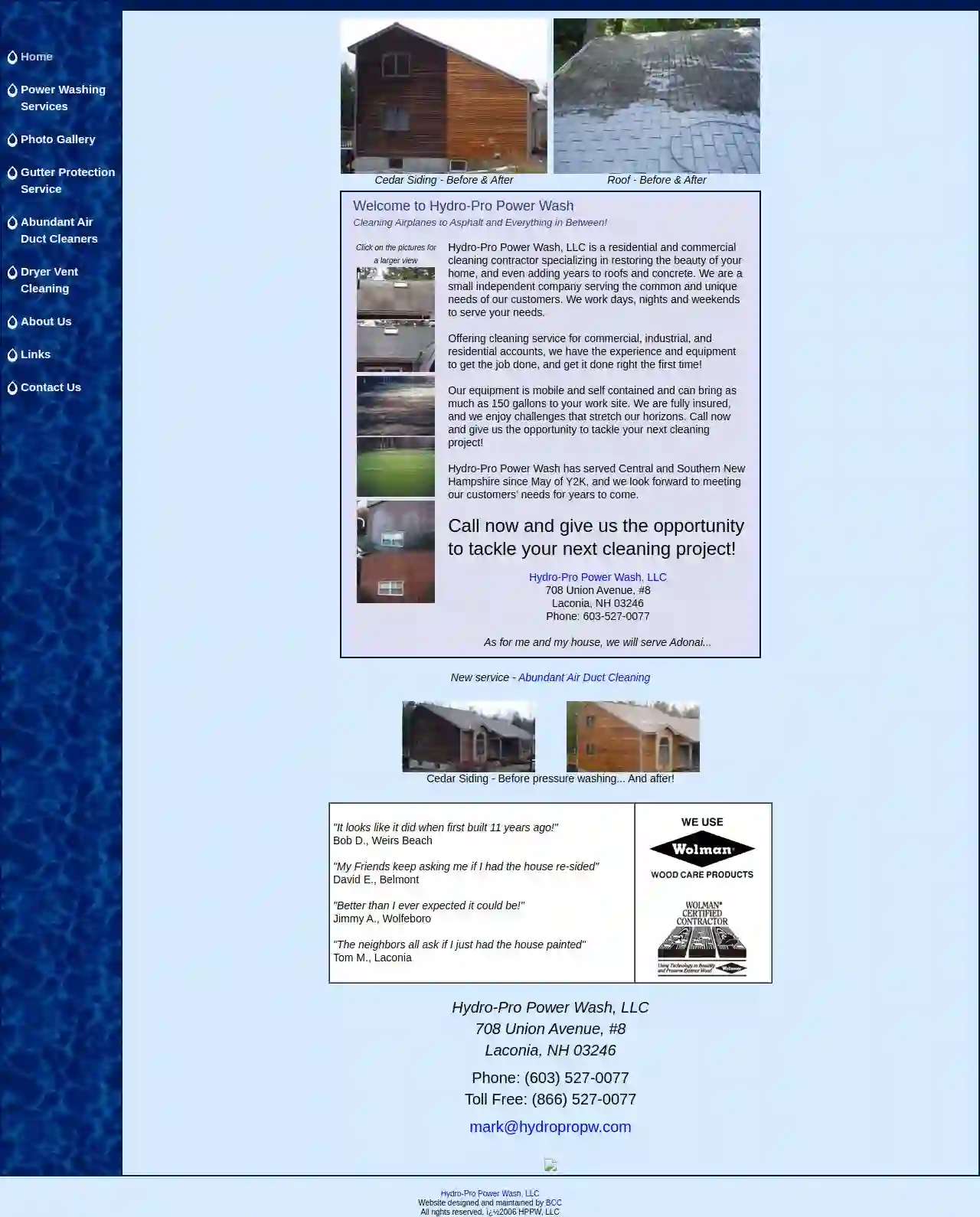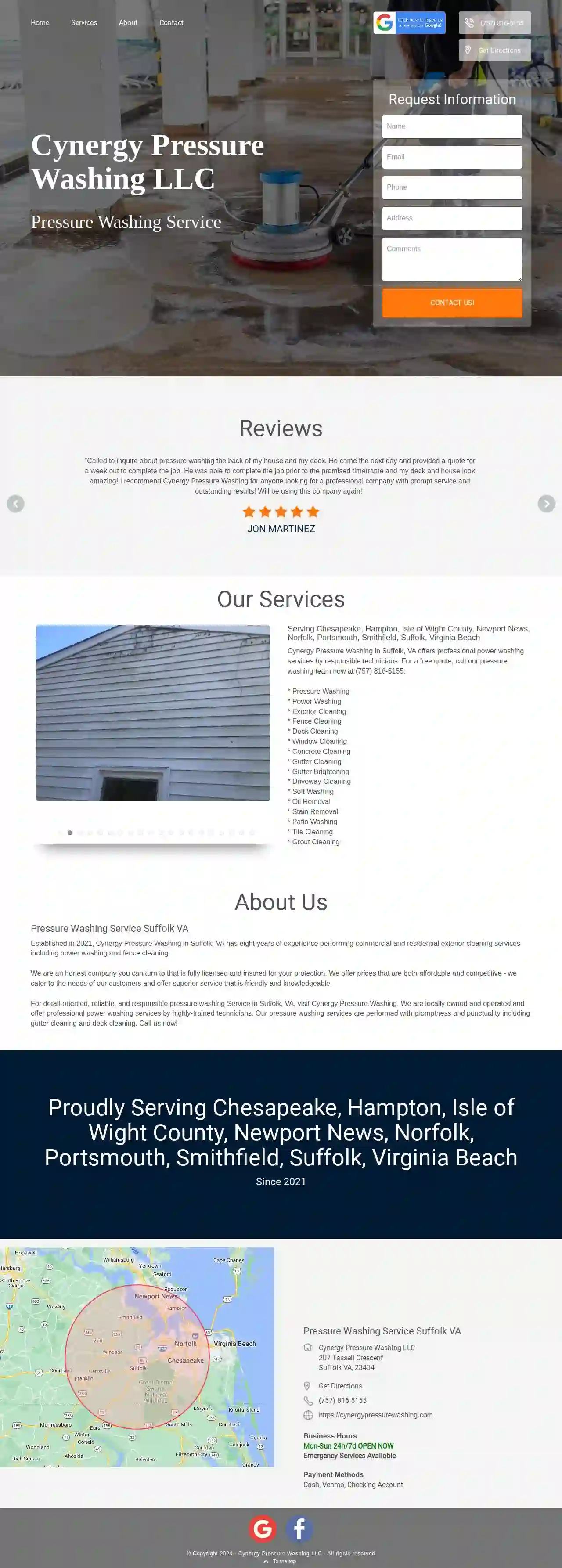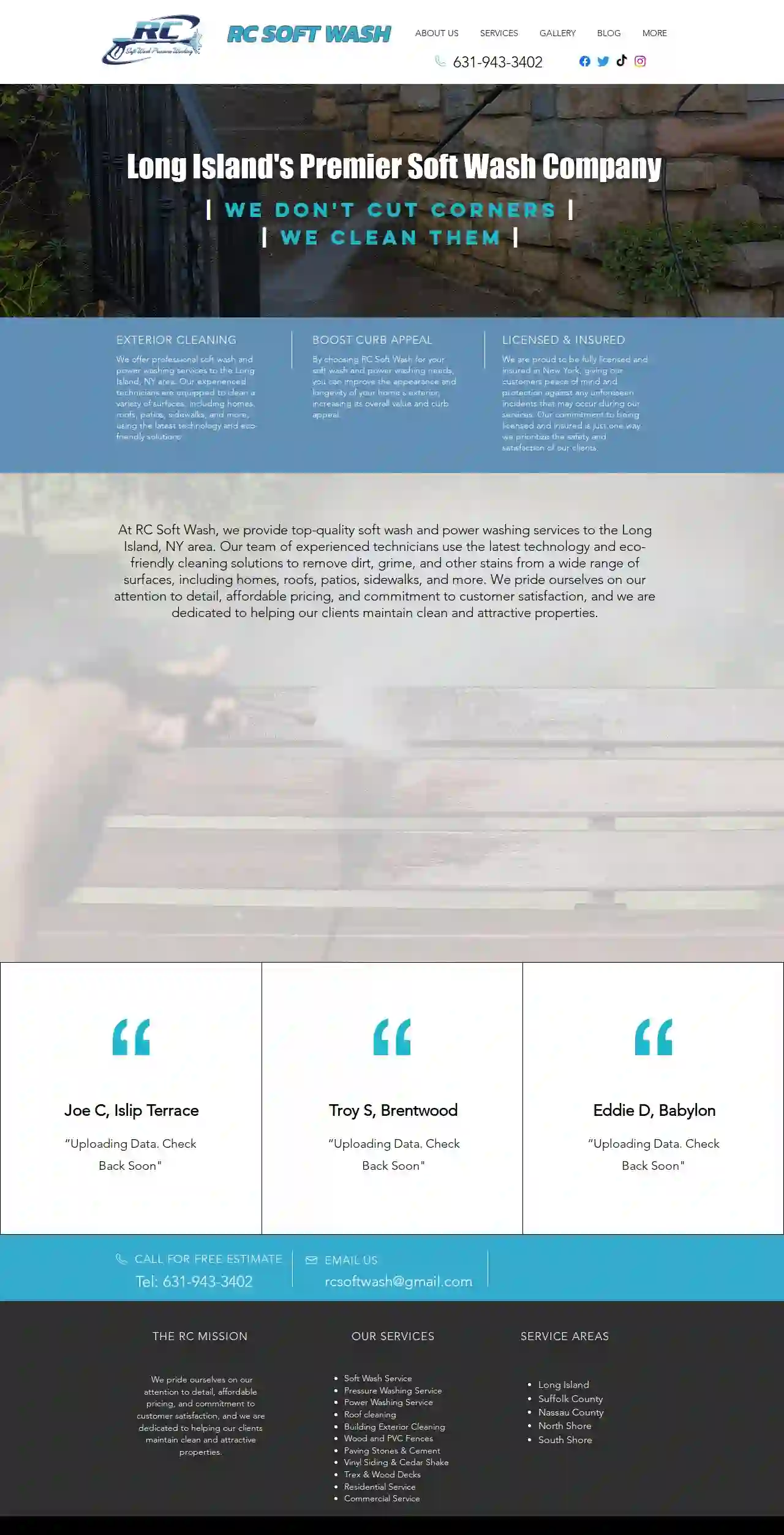Pressure Washing University of Virginia
Best Pressure Washing in University of Virginia
Receive up to 3 Power Washing quotes for your project today! Compare profiles, reviews, accreditations, portfolio, etc... and choose the best offer.

Shore To Shore Power Washing
5142 reviewsKings Park, 64 Dogwood Rd, 11754, USShore to Shore Power Washing is a professional power washing company dedicated to helping keep your home or business clean. We offer a range of services including house washing, pressure washing, roof washing, deck cleaning and staining, exterior window cleaning, concrete cleaning and sealing, paver cleaning, sanding, and sealing, interior gutter cleaning, stain removal, efflorescence removal, solar panels cleaning, and fence washing. Our team uses state-of-the-art equipment and eco-friendly cleaning solutions to deliver exceptional results. With over 10 years of experience and 500+ happy customers, we are committed to providing top-notch service and ensuring customer satisfaction.
- Services
- Why Us?
- Testimonials
- Gallery
Get Quote
Hydro-Pro Power Wash, LLC & Abundant Air Duct Cleaners
Meredith, NH, 163 Meredith Center Road, 03253, USWelcome to Hydro-Pro Power Wash, a residential and commercial cleaning contractor specializing in restoring the beauty of your home, and even adding years to roofs and concrete. We are a small independent company serving the common and unique needs of our customers. We work days, nights and weekends to serve your needs. Offering cleaning service for commercial, industrial, and residential accounts, we have the experience and equipment to get the job done, and get it done right the first time! Our equipment is mobile and self-contained and can bring as much as 150 gallons to your work site. We are fully insured, and we enjoy challenges that stretch our horizons. Call now and give us the opportunity to tackle your next cleaning project! Hydro-Pro Power Wash has served Central and Southern New Hampshire since May of Y2K, and we look forward to meeting our customers' needs for years to come. Call now and give us the opportunity to tackle your next cleaning project!
- Services
- Why Us?
- Our Team
- Testimonials
- Gallery
Get Quote
Cynergy Pressure Washing, LLC
4.610 reviews207 Tassell Crescent, Suffolk, 23434, USEstablished in 2021, Cynergy Pressure Washing in Suffolk, VA has eight years of experience performing commercial and residential exterior cleaning services including power washing and fence cleaning. We are an honest company you can turn to that is fully licensed and insured for your protection. We offer prices that are both affordable and competitive - we cater to the needs of our customers and offer superior service that is friendly and knowledgeable. For detail-oriented, reliable, and responsible pressure washing Service in Suffolk, VA, visit Cynergy Pressure Washing. We are locally owned and operated and offer professional power washing services by highly-trained technicians. Our pressure washing services are performed with promptness and punctuality including gutter cleaning and deck cleaning. Call us now!
- Services
- Why Us?
- Our Team
- Testimonials
- Gallery
Get Quote
Elite Pressure Washing Arlington
123 Main St, Apt 101, Arlington, 22201, USElite Pressure Washing Arlington - We Give Free Estimates - Call And Speak With David. Our Customer Rating: 7 Reviews, Averaging 5 Stars!
- Services
- Why Us?
- Accreditations
- Our Team
- Testimonials
- Gallery
Get Quote
Top Notch Pressure Washing & Cleaning LLC
52 reviewsUSTop Notch Pressure Washing & Cleaning LLC is a locally owned and operated business dedicated to providing high-quality cleaning services for a wide range of clients. We specialize in pressure washing, exhaust hood cleaning, and janitorial services, serving homes, restaurants, food trucks, schools, churches, medical facilities, office buildings, and more. We take pride in our commitment to customer satisfaction, ensuring that every client receives reliable and thorough cleaning services. With over 5 years of experience in the industry, we have built a reputation for excellence and trustworthiness. Our team of certified professionals utilizes top-quality products and techniques to deliver exceptional results. We are NFPA code 96 certified to inspect and clean all exhaust systems, ensuring compliance with safety standards. We offer free quotes and flexible scheduling options to meet your specific needs. At Top Notch Pressure Washing & Cleaning LLC, we understand the importance of a clean and healthy environment. Our mission is to provide our clients with peace of mind by delivering exceptional cleaning services that exceed their expectations. We are committed to using environmentally friendly products whenever possible and to minimizing our impact on the environment. Meet Jasmine D., the owner of Top Notch Pressure Washing & Cleaning LLC. Jasmine is a driven and passionate entrepreneur who is dedicated to providing her clients with the best possible service. She is a member of the National Fire Protection Association (NFPA) and the Women Impacting Public Policy (WIPP). Jasmine is also a certified NFPA Code 96 Inspector/Cleaner and SWAM certified. Her commitment to excellence and customer satisfaction is evident in every aspect of her business. Some of our valued clients include McDonald's, Hilton Garden Inn Hotel, HMR Properties, Sonic Drive In, and Dodges Southern Style Chicken. We are proud to serve the Newport News, Virginia community and surrounding areas.
- Services
- Why Us?
- Accreditations
- Our Team
- Gallery
Get Quote
PERFECTION POWER WASHING LLC
549 reviewsPerfection Power Washing, Haverhill, 01835, USPerfection Power Washing is a professional contractor offering exterior cleaning and pressure washing services to help remove years of grit, grime, and grease quickly, affordably, and safely. We are dedicated to helping our clients with all sizes of exterior cleaning projects and a variety of pressure washing services. From boats and RVs to fleet and commercial building complex washing projects, Perfection Power Washing is ready for all types of pressure washing needs in the Haverhill, MA and Southwest Florida area. Our team is supplied with the skills and equipment to complete your cleaning projects safely, efficiently, on-time, and on-budget. We are proud to bring our industry experience to each and every job we do. Whether you're looking to clean up the boat or RV, finish a minor clean-up job to restore curb appeal, or prepping for a major project, our knowledgeable team has the skills and tools to make sure the job is done right. Our team is large enough to deliver professional exterior cleaning solutions while offering the personal touches that ensure we meet your goals and exceed your expectations.
- Services
- Why Us?
- Accreditations
- Gallery
Get Quote
Tidal Pressure Washing
52 reviews4458 Lookout Rd, #B, 4458 Lookout Rd #B, Virginia Beach, 23455, USTidal Pressure Washing LLC is your trusted pressure washing service in Virginia Beach, VA. We are dedicated to providing exceptional results for both residential and commercial properties. We understand the importance of maintaining your property's appearance and value, and we strive to exceed your expectations with every service. As a Veteran / LEO-owned and operated business, we offer competitive pricing and discounts to Military members and First Responders. We are licensed and insured, and we use high-quality equipment and cleaning solutions to ensure a thorough and safe cleaning process. Our team of experienced professionals is committed to providing outstanding customer service and delivering guaranteed results. We offer a wide range of services, including house washing, roof cleaning, concrete cleaning, patio cleaning, driveway cleaning, deck cleaning, fence cleaning, gutter cleaning, window cleaning, and rust removal. Whether you need a one-time cleaning or a scheduled maintenance plan, Tidal Pressure Washing LLC is here to help. Contact us today for a free estimate and let us show you the Tidal difference!
- Services
- Why Us?
- Accreditations
- Testimonials
- Gallery
Get Quote
RC Soft Wash
57 reviewsSuffolk, USRC Soft Wash is Long Island's premier soft wash and power washing company. We are dedicated to providing top-quality services to both residential and commercial clients throughout the Long Island, NY area. Our experienced technicians utilize the latest technology and eco-friendly cleaning solutions to ensure your property looks its best. We understand that your home or business is a valuable investment, and we strive to enhance its appearance and longevity. Whether you need roof cleaning, building exterior washing, or fence restoration, our team is equipped to handle all your soft wash and power washing needs. At RC Soft Wash, we pride ourselves on our attention to detail, affordable pricing, and commitment to customer satisfaction. We are fully licensed and insured in New York, providing you with peace of mind and protection. Contact us today for a free estimate and let us help you maintain a clean and attractive property.
- Services
- Why Us?
- Testimonials
- Gallery
Get Quote
Smithtown Pressure Washing
54 reviewsSmithtown, 11776, USSmithtown Pressure Washing is a locally owned and operated business serving Smithtown, NY and surrounding areas. We specialize in providing high-quality pressure washing services for both residential and commercial properties. Our team is comprised of experienced and certified professionals who are dedicated to delivering exceptional results. We utilize powerful equipment and environmentally friendly solutions to ensure the safety of your property and the environment. Our services include house washing, deck cleaning, driveway cleaning, patio cleaning, roof cleaning, sidewalk cleaning, graffiti removal, dumpster cleaning, parking lot cleaning, and more. We are committed to exceeding customer expectations and providing a stress-free experience.
- Services
- Why Us?
- Accreditations
- Testimonials
- Gallery
Get Quote
Western Maine Pressure Washing
514 reviewsFryeburg, ME, 04037, USWestern Maine Pressure Washing has been providing residential and commercial pressure washing services in the Greater Portland area since 2012. We are committed to delivering high-quality results at competitive prices. Our range of services includes everything from roof cleaning and deck cleaning to house washing and multi-unit cleaning. We take pride in helping our clients keep their homes and businesses looking their best. We are a family-owned and operated business, and we are dedicated to providing our customers with exceptional service. Our team of experienced professionals uses the latest equipment and techniques to ensure that your property receives the best possible care. Whether you need a one-time cleaning or regular maintenance, Western Maine Pressure Washing is here to help. Contact us today for a free quote!
- Services
- Why Us?
- Gallery
Get Quote
Over 60,241+ Cleaning Companies onboarded
Our janitorial services operate in University of Virginia and surrounding areas!
CleaningMatch has curated and vetted Top Janitorial Services near University of Virginia. Find the most reliable business today.
Frequently Asked Questions About Pressure Washing
- Enhanced Curb Appeal: Pressure washing removes dirt, grime, and stains, instantly revitalizing the appearance of your property and boosting curb appeal.
- Improved Health and Safety: Pressure washing removes mold, mildew, algae, and other contaminants that can pose health risks and create slippery surfaces.
- Increased Property Value: A well-maintained exterior, achieved through regular pressure washing, can increase the value of your property.
- Preventative Maintenance: Pressure washing removes dirt and grime that can deteriorate surfaces over time, extending the lifespan of your driveway, deck, fence, and other exterior features.
- Preparation for Painting or Staining: Pressure washing is an essential step before painting or staining, as it provides a clean and receptive surface for the new coating to adhere to.
- Spring and Fall: Spring and fall are often ideal for pressure washing as the temperatures are moderate and the weather is typically dry.
- Summer: Pressure washing can be done in the summer, but avoid doing so during the hottest part of the day to prevent the cleaning solutions from drying too quickly and leaving streaks.
- Winter: Pressure washing is possible in the winter, but be mindful of freezing temperatures that can affect cleaning solutions and cause slippery surfaces.
- Experience: 'How long have you been in business, and what types of pressure washing projects do you specialize in?'
- Licensing and Insurance: 'Are you licensed, insured, and bonded? Can I see proof of coverage?'
- Equipment and Techniques: 'What type of pressure washer do you use? What cleaning solutions do you use, and are they safe for my surfaces?'
- Safety Precautions: 'What safety precautions do you take during pressure washing?'
- Surface Preparation: 'Will you need to move any furniture or objects before pressure washing?'
- Water Usage: 'Do you use a water reclamation system or other methods to conserve water?'
- Cleanup: 'How do you handle cleanup after pressure washing?'
- Guarantees: 'Do you offer a satisfaction guarantee?'
- References: 'Can you provide references from previous clients?'
- Cover or Shield Plants: Before pressure washing, cover or shield delicate plants and landscaping with tarps, plastic sheeting, or painter's tape to protect them from water spray and chemicals.
- Use Lower Pressure Settings: If pressure washing near plants, use lower pressure settings and avoid directing the spray directly at them.
- Rinse Plants with Water: After pressure washing, rinse plants thoroughly with plain water to dilute any chemicals that may have landed on them.
- Choose Plant-Safe Cleaning Solutions: If using cleaning solutions, opt for environmentally friendly or plant-safe options whenever possible.
What are the benefits of pressure washing?
Whether you're looking to improve your property's appearance, protect its value, or enhance health and safety, pressure washing is a valuable investment.
What is the best time of year for pressure washing?
Choose a day with mild temperatures and dry weather for optimal pressure washing results. Avoid pressure washing in extreme heat, freezing temperatures, or rainy conditions.
What questions should I ask a pressure washing contractor before hiring them?
By asking these questions, you can gather valuable information and choose a pressure washing contractor that meets your requirements.
Can pressure washing damage my plants?
Taking these precautions minimizes the risk of damage to your plants and landscaping during pressure washing.
What are the benefits of pressure washing?
- Enhanced Curb Appeal: Pressure washing removes dirt, grime, and stains, instantly revitalizing the appearance of your property and boosting curb appeal.
- Improved Health and Safety: Pressure washing removes mold, mildew, algae, and other contaminants that can pose health risks and create slippery surfaces.
- Increased Property Value: A well-maintained exterior, achieved through regular pressure washing, can increase the value of your property.
- Preventative Maintenance: Pressure washing removes dirt and grime that can deteriorate surfaces over time, extending the lifespan of your driveway, deck, fence, and other exterior features.
- Preparation for Painting or Staining: Pressure washing is an essential step before painting or staining, as it provides a clean and receptive surface for the new coating to adhere to.
Whether you're looking to improve your property's appearance, protect its value, or enhance health and safety, pressure washing is a valuable investment.
What is the best time of year for pressure washing?
- Spring and Fall: Spring and fall are often ideal for pressure washing as the temperatures are moderate and the weather is typically dry.
- Summer: Pressure washing can be done in the summer, but avoid doing so during the hottest part of the day to prevent the cleaning solutions from drying too quickly and leaving streaks.
- Winter: Pressure washing is possible in the winter, but be mindful of freezing temperatures that can affect cleaning solutions and cause slippery surfaces.
Choose a day with mild temperatures and dry weather for optimal pressure washing results. Avoid pressure washing in extreme heat, freezing temperatures, or rainy conditions.
What questions should I ask a pressure washing contractor before hiring them?
- Experience: 'How long have you been in business, and what types of pressure washing projects do you specialize in?'
- Licensing and Insurance: 'Are you licensed, insured, and bonded? Can I see proof of coverage?'
- Equipment and Techniques: 'What type of pressure washer do you use? What cleaning solutions do you use, and are they safe for my surfaces?'
- Safety Precautions: 'What safety precautions do you take during pressure washing?'
- Surface Preparation: 'Will you need to move any furniture or objects before pressure washing?'
- Water Usage: 'Do you use a water reclamation system or other methods to conserve water?'
- Cleanup: 'How do you handle cleanup after pressure washing?'
- Guarantees: 'Do you offer a satisfaction guarantee?'
- References: 'Can you provide references from previous clients?'
By asking these questions, you can gather valuable information and choose a pressure washing contractor that meets your requirements.
Can pressure washing damage my plants?
- Cover or Shield Plants: Before pressure washing, cover or shield delicate plants and landscaping with tarps, plastic sheeting, or painter's tape to protect them from water spray and chemicals.
- Use Lower Pressure Settings: If pressure washing near plants, use lower pressure settings and avoid directing the spray directly at them.
- Rinse Plants with Water: After pressure washing, rinse plants thoroughly with plain water to dilute any chemicals that may have landed on them.
- Choose Plant-Safe Cleaning Solutions: If using cleaning solutions, opt for environmentally friendly or plant-safe options whenever possible.
Taking these precautions minimizes the risk of damage to your plants and landscaping during pressure washing.